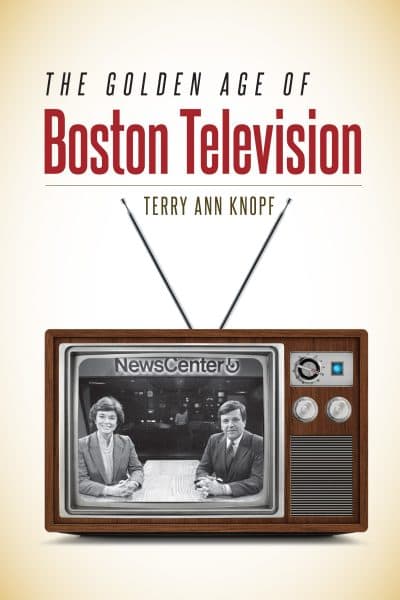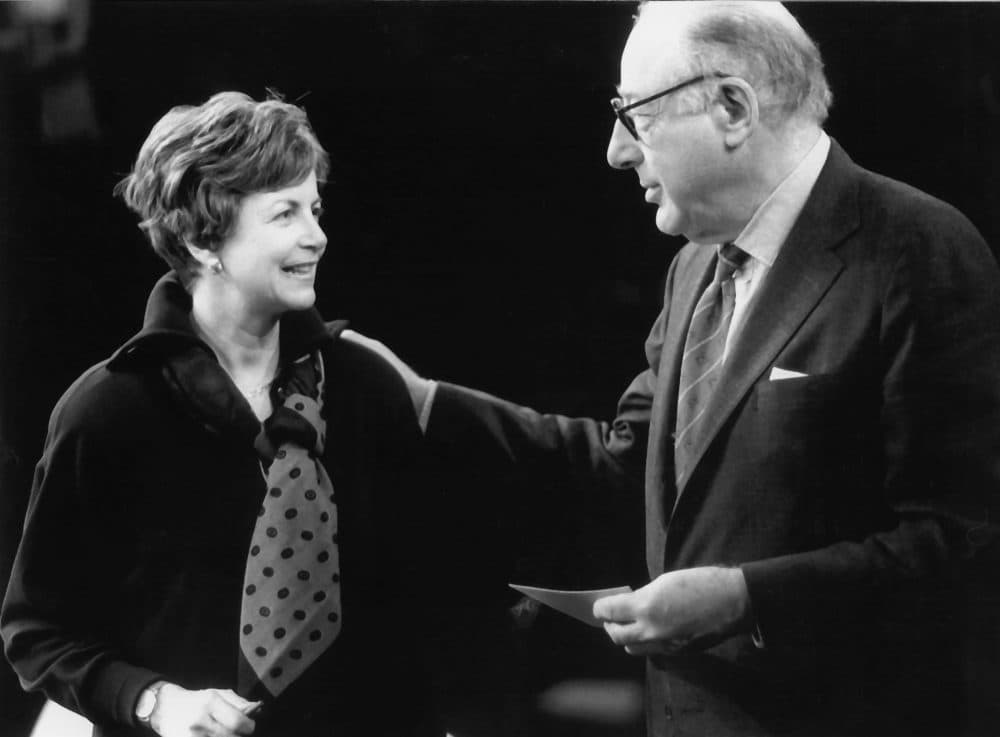Advertisement
Review
Remembering When Boston TV News Was Shooting For The Moon Instead Of Plumbing The Depths

"The Golden Age" is a catchphrase tossed around willy-nilly these days. We’ve had the Golden Age of Bodybuilding, the Golden Age of Bacteriology and the Golden Age of Jewish Baseball. So it was inevitable, perhaps, that someone would write a book about a productive era in Boston television, from the '70s to the '90s, when the city was known for distinguished local news and programming, and what else would such a book be called but "The Golden Age of Boston Television."
If the title sounds oxymoronic, well, it is.
The author is Terry Ann Knopf, a crusty commentator who has written for a number of publications, including the Boston Globe from 1978 to 1982, but especially for the Patriot Ledger in Quincy, where she was television critic from 1982 to 1991.
At the now defunct Lemberg Center for the Study of Violence at Brandeis, Knopf served as a research associate on race and the media, and that may have emboldened her insights into what may be the strongest segment of her book: her condemnation of Boston television for being lethargic in hiring and providing equal opportunities to minorities and to women, for which, alone, Boston’s Golden Age of television ought to be demoted to the "Silver Age of Boston Television," or to the "Bronze Age," or perhaps to the "I Guess We’re Not Really That Much Better Than Anybody Else Age of Boston Television."
Knopf makes a compelling case that Boston did, in fact, enjoy a productive as well as profitable period from the '70s to the '90s, but she fails to provide enough data about what was happening in other cities to enable a reader to judge whether that was, in fact, a "Golden Age" in Boston.
What makes that era seem if not golden then at least more sophisticated is that by comparison, local television today, Boston included, is in the doldrums. For the declining influence of local television, and for the withering influence upon younger viewers, executives blame the internet and the profusion of cable options. A reason they do not acknowledge is that it was made easier by the decline in quality since the era Knopf describes.
What makes that era seem if not golden then at least more sophisticated is that by comparison, local television today, Boston included, is in the doldrums.
Jack Thomas
Once upon a time, Channel 5’s Natalie Jacobson and Chet Curtis were to local television what Walter Cronkite was to national. Chuck Kraemer was a crackerjack writer, and so was Clark Booth. Martha Bradlee (now Raddatz) and R.D. Sahl were no-nonsense reporters, and in the arts world, Joyce Kulhawik knew what she was talking about. On local television today, upon whom do we rely upon for sophisticated coverage of the arts in Boston?
As the principal owner of Channel 7, David Mugar made some unfortunate choices for his management team, but he cared about quality because he didn’t want to run into his neighbors and be challenged as to why Channel 7 wasn’t doing a better job. By comparison, today, how many of us can name the owners of local television stations?
How can a viewer tell that television has gone downhill? Watch the nightly newscasts, and you cannot escape an awareness that there’s a preoccupation with profit, a docility to the lower common intellect, and newscasts that deliver, night after night, a mind-numbing sequence of fires, crime stories, automobile accidents and those agonizingly long weather forecasts that dwell on this record humidity or that wind gust, and on a comparison of temperatures in Montana and Kansas, and then upon the puzzlement as to whether the low pressure system in Indiana will turn north or veer east to New England with the result that at some time, in some places there may be some amount of what they call scattered precip.
Knopf’s book may be gobbled up locally by those in television eager to see if their names are among the more than 169 listed in the index. On the other hand, given the perspective, which is doggedly local, it’s difficult to imagine that the book will find a voracious national audience, and given its antiquated time frame — it begins nearly half a century ago — it’s also unlikely that the book will be devoured by younger generations who believe that events prior to 2000 should be filed under “The Middle Ages.”
And that’s too bad, because if TV is your passion, then this is your publication, and you may well agree with Knopf’s premise, as I do, that television content ought to be a lot better than what is foisted upon us these days.
Readers who recall Knopf’s waspish columns may be surprised to hear a now mellow voice. While acknowledging that WBZ-TV’s "Evening Magazine" eventually faltered, she recalls it as a charming, interesting, fast-paced show celebrating Boston and New England "in its own bright, breezy, boisterous way." In 1989, as the program began a decline, she summarized it more harshly in Boston Magazine: “Whereas 'Evening Magazine' was once a bright and bouncy show, it now focuses on the dark and sinister. Whereas it once gravitated toward charming human interest stories, it now wallows in sex, violence, and freak-of-the-month stories. Whereas it once erred on the side of softness, it is now afflicted with its very own sleaze factor.”
She attributes the prolific programming of yesteryear to the rare occurrence of two stations undergoing license changes to ambitious local owners, Channel 5 in 1972 and Channel 7 in 1982, and to a flourishing local economy that provided television executives with the capital to invest in imaginative programming. Her book has minor errata. She repeats a reporter’s error by calling Ray Kurzweil “Roy.” She refers to James Kelly as “an arch foe of busing and now a Boston city councilor,” but he died in 2007. In talking about television’s capacity to create celebrities, she writes two sentences at a 62-word length, and then, two paragraphs later, she repeats the two sentences verbatim. These are easily corrected in subsequent editions.

There’s drama and conflict, like the ordeal endured by Liz Walker in the shameful public disdain she suffered after giving birth out of wedlock; like the propriety of Channel 7’s publicity stunt of staging newscasts from suburban shopping malls; like the lesbian nuns controversy (details in the book), and like the condom conundrum — whether to accept ads for condoms out of concern for the health of viewers or reject them in genuflection before the Roman Catholic Church.
The book is rich in personal anecdotes, from the day (long before the main scope of her tales) that the clock at Channel 4 studios fell on the head of President-elect Dwight D. Eisenhower to the $12.50 that anchor Tom Ellis spent in San Diego, at Painless Nell’s, for a tattoo on his right arm of an "innocuous little snake," whatever that is. And who else would remind us of Channel 7 sportscaster Zip Rzeppa, who picked the wrong team to win a Super Bowl and began his next newscast by cracking a raw egg on his forehead, then delivering the news with yolk dribbling to his chin.
And yes, in the television business, sex is a big topic. When I began writing about television for the Boston Globe in 1982, WCVB-TV manager Robert Bennett had some advice. “The secret to writing about television in Boston,” he said, “is to know who’s (sleeping with) whom.”
Knopf’s references to sex are few, to be sure — some tepid, others torrid. Before his "Good Day!" appearance, vaudevillian George Jessel startled what Knopf describes as a pretty, young production assistant who complained of Jessel: “That man just stuck his tongue down my throat.” A producer at "Good Day!" is described as providing women on his staff with unsolicited back rubs and greeting them with: “Take your clothes off.” He made a pass at Knopf, too, she says, although she grants clemency. “Some of the antics … may be traced to the television culture itself — television being a much more visceral, touchy-feely medium as compared to, say, newspaper newsrooms, where journalists tend to be more restrained and less demonstrative.”
Whoa, not so fast!
Having worked at newspapers for four decades, I can attest that Knopf has missed the boat about sex in the city room. At the Globe, the honorable and straitlaced publisher William Davis Taylor was so aghast at sexual shenanigans among reporters and editors that he once referred to his city room as “The Love Boat.”
Knopf saves a shocking episode for the end, one for which she warns readers that "the details … are graphic.” She tells of a lunch, in 1983, at an upscale restaurant in Boston’s financial district. She describes Linda Harris, in the lexicon of the day, as an on-air talent, an intelligent, attractive, African-American woman in her early 40s who dines with a senior local executive of WBZ-TV. He is not named. As Knopf writes, in the car en route back to WBZ in Allston, the TV executive, suddenly and without warning, produces a handkerchief, grabs Harris' hand, brings it to his groin and “sexually assaults” her. After the act is consummated, Knopf writes, the senior executive turns to Harris and says, “Look what you made me do.”
As Knopf writes, some months later the senior executive left the station, and then invited Harris to dinner at the Hampshire House on Beacon Street, where he blamed his behavior on alcohol and apologized. Did she forgive him? “No,” Harris says, according to Knopf. “Men still call the shots. For God’s sake, this was a man … that signed my (expletive) paycheck! This is what women still have to face in the workplace.”
Human nature being what it is, that incident will induce a guessing game as to the identity of the senior-level executive at Channel 4. But focusing only on that question would be unfortunate, for Knopf has written an informative and sometimes entertaining book about the production of good local television, and how it can be diminished by greed, ego, ambition, profit incentives, an obsession with ratings and capricious standards about beauty, civic responsibility, journalistic integrity and apathy in providing equal opportunities for minorities and women.
It’s a book that ought to be required reading at schools of communication, because it’s a prescription for something that we all agree is sorely needed these days — better television.
Jack Thomas, whose writing has appeared in the Boston Globe in the past seven decades, was on the Globe staff from 1963 to 2006, as city editor, columnist, feature writer and ombudsman. He was television critic from 1981 to 1988.